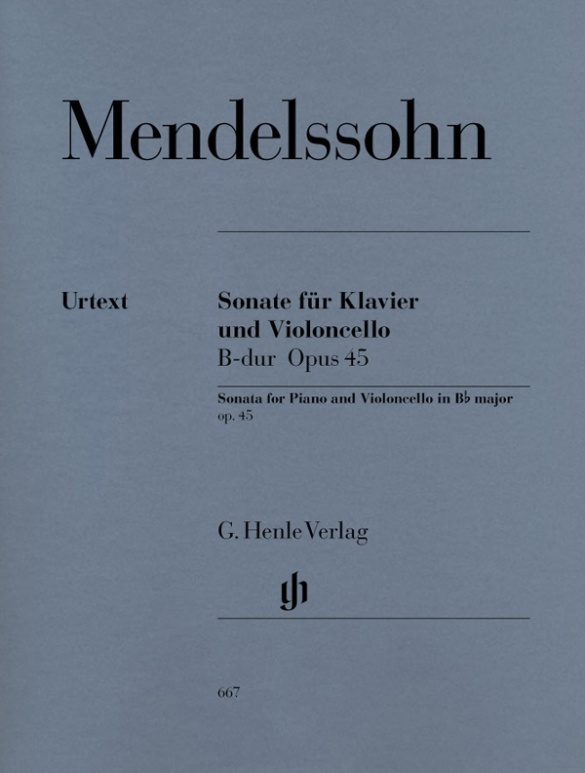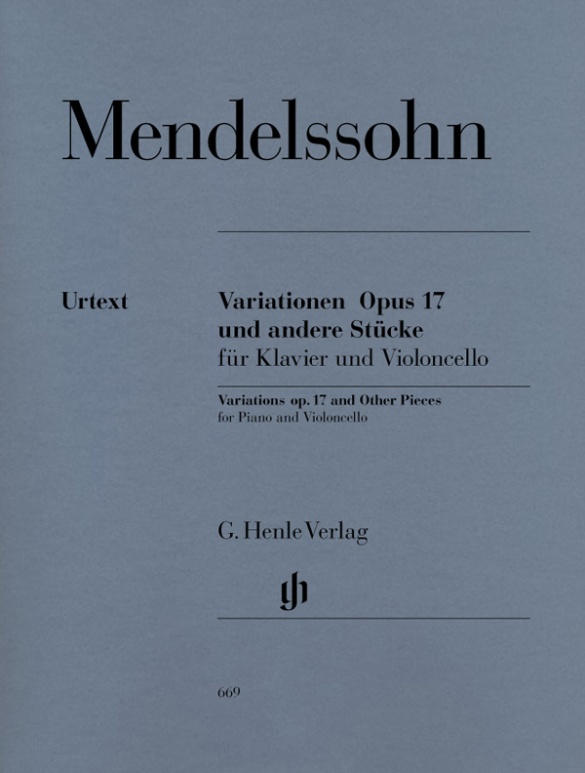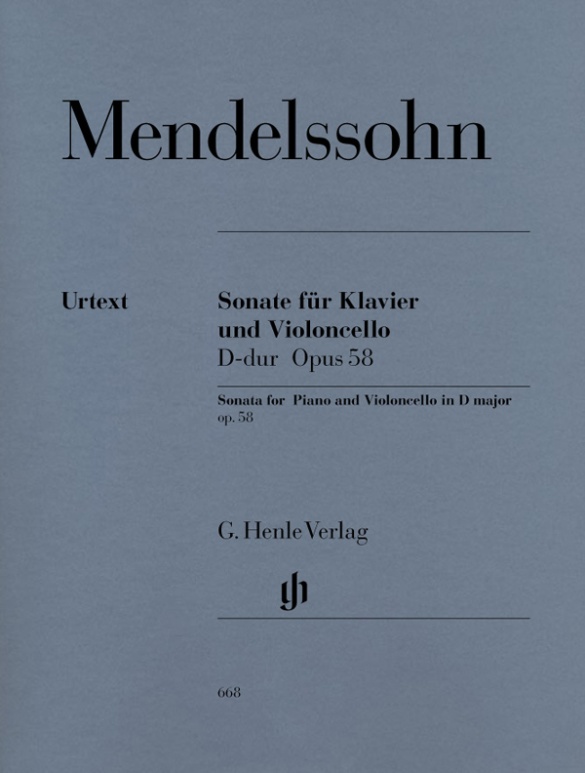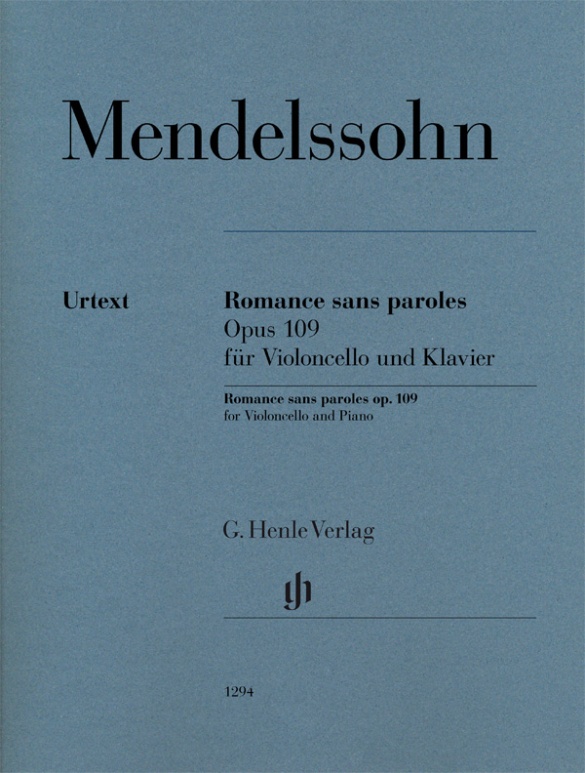

Felix Mendelssohn Bartholdy
Romance sans paroles op. 109
The “Romance sans paroles dédiée à Mlle. Lise Christiani” – thus described in the surviving autograph – was only published as op. 109 from the composer’s estate in 1868. The French cellist Lise Christiani gave several concerts in Leipzig in October 1845, where she met with Mendelssohn and presumably commissioned him to write this charming work. It is the only “Song without words” that Mendelssohn wrote for two instruments, not piano solo. It was previously only available as part of a collection of works for this instrumentation (HN 669). However, the “Romance sans paroles”, a favourite with cellists, is now also available as a single Henle Urtext edition.
Content/Details
(Explanation)
About the Composer
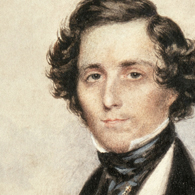
Felix Mendelssohn Bartholdy
A German composer, conductor, pianist, and organist who already numbered among the most important composers in Europe during his lifetime. While still young he found a unique tonal language. Reflected in his oeuvre, which spans all genres, are the contradictory tendencies of the age – Classicism and Romanticism. His endeavors over the course his life to perform the works of Johann Sebastian Bach led to a “rediscovery” of that composer which continues unabated. His intensive engagement with Bach and his counterpoint influenced his own compositional technique.
| 1809 | Born into a wealthy banker’s family in Hamburg on February 3. Escape to Berlin with his parents in 1811. First musical instruction from his mother. |
| 1819 | He becomes a pupil of Carl Friedrich Zelter. |
| 1820 | Joins the Sing-Akademie in Berlin. |
| 1821–23 | Twelve sinfonias for strings. |
| 1825 | String Octet in E-flat major, Op. 20. |
| 1826 | Overture to “A Midsummer Night’s Dream,” Op. 21 |
| 1827 | Begins studies at the University of Berlin. |
| 1829 | Revival of Bach’s St. Matthew Passion in Berlin on March 11 and 21. Travels to England and Scotland. |
| 1829–30 | “Reformation” Symphony in D minor, [Op. 107], with inclusion of the choral “Ein feste Burg“ (A Mighty Fortress Is Our God.) |
| 1830–32 | Extended travels, including to Italy and France. Piano Concerto in G minor, Op. 25; Overture in B minor, Op. 26, “The Hebrides, or Fingal’s Cave” (1829–30). |
| 1833 | Music director in Düsseldorf. “Italian” Symphony in A major, Op. 90 (1830–33). |
| 1835 | Director of the Gewandhaus concerts in Leipzig. |
| 1836 | Premiere in Düsseldorf of his oratorio “St. Paul: Oratorio on Words of the Holy Bible,” Op. 36. |
| 1838-44 | Violin Concerto in E minor, Op. 64. |
| 1840 | Composition of “Hymn of Praise, a Symphony-Cantata on Words of the Holy Bible,” Op. 52. |
| 1841 | Berlin, in the service of the Prussian king. “Variations sérieuses” in D minor, Op. 54, for piano. |
| 1842 | Completion of Symphony No. 3 (“Scottish”) in A minor, Op. 56, with a songlike opening. |
| 1843 | Incidental music to Shakespeare’s “A Midsummer Night’s Dream,” Op. 61. Director of the newly founded Leipzig Conservatory. |
| 1846 | Premiere of his oratorio “Elijah,” Op. 70, in Birmingham. |
| 1847 | String Quartet in F minor, [Op. 80]. Death in Leipzig on November 4. |
About the Authors
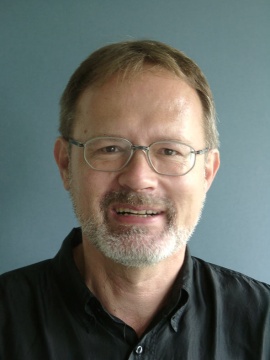
Ernst-Günter Heinemann (Editor)
Dr. Ernst-Günter Heinemann, born in 1945 in Bad Marienberg (Westerwald), completed his schooling in Gießen and read musicology, philosophy and German in Marburg and Frankfurt/Main and also for some time Protestant church music. He did his doctorate on “Franz Liszts geistliche Musik. Zum Konflikt von Kunst und Engagement”.
From 1978–2010 Heinemann worked as an editor at G. Henle Publishers (in 1978 in Duisburg, from 1979 onwards in Munich). He edited a great many Urtext editions for the publishing house, including “Das Wohltemperierte Klavier”, Volume 1 by Bach and all of Debussy’s piano works. In addition, he wrote essays on Debussy, Grieg, Liszt, Mendelssohn and questions concerning general editing, as well as giving seminars on editorial practice for musicology students in Munich.

Klaus Schilde (Fingering Piano)
Prof. Klaus Schilde, born in 1926, spent his childhood in Dresden. There he was greatly influenced by Walter Engel, who taught him the piano (Kodaly method), composition and violin. From 1946–1948 he studied at the music conservatory in Leipzig with Hugo Steurer. After moving to the west in 1952 he studied with Walter Gieseking and Edwin Fischer, as well as with Marguerite Long, Lucette Descaves and Nadia Boulanger in Paris.
Schilde won numerous prizes. From 1947 onwards he gave concerts as a soloist and chamber musician on almost every single continent with renowned orchestras. He taught at the music conservatories in East Berlin Detmold, West Berlin, Munich, Tokyo (Geidai) and Weimar. From 1988–1991 he was President of the Staatliche Hochschule für Musik und Theater in Munich, where he also taught for decades as a professor. There are numerous radio and television broadcasts with Klaus Schilde as well as CD recordings. Schilde has contributed fingerings to almost 100 Henle Urtext editions.
Prof. Klaus Schilde passed away on 10 December, 2020.
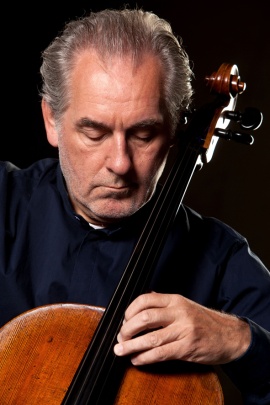
Claus Kanngiesser (Fingering and bowing for Violoncello)
Product Safety Informations (GPSR)

G. Henle Verlag
Here you can find the information about the manufacturer of the product.G. Henle Verlag e.K.
Forstenrieder Allee 122
81476 München
Germany
info@henle.de
www.henle.com
Free of earlier interventions by German and English first editions, cellists can rest easy with Ernst-Gunter Heinemann's meticulous editing in Henle's urtext printing. A supplementary cello part marked by Claus Kanngiesser adds further value.
Strings Magazine, 2016recommendations
autogenerated_cross_selling
Further editions of this title
Further editions of this title


